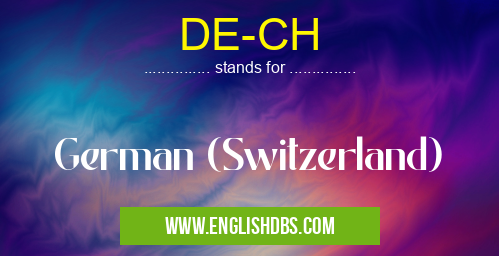What does DE-CH mean in GERMAN
DE-CH is a code that refers to the German language as spoken in Switzerland. It is a combination of the ISO 639-1 code for German (DE) and the ISO 3166-2 code for Switzerland (CH).

DE-CH meaning in German in International
DE-CH mostly used in an acronym German in Category International that means German (Switzerland)
Shorthand: DE-CH,
Full Form: German (Switzerland)
For more information of "German (Switzerland)", see the section below.
» International » German
DE-CH Meaning in INTERNATIONAL
DE-CH is a common language code used in international contexts to distinguish the Swiss German dialect from other variants of German. It is used in various areas, including:
- Language settings: In software and online platforms, DE-CH is used to specify the Swiss German language option.
- Document localization: When translating documents into German, DE-CH indicates that the translation should use the Swiss German variant.
- Website localization: Websites can be localized for the Swiss German audience by using the DE-CH code in their language settings.
DE-CH Full Form
The full form of DE-CH is:
- DE: ISO 639-1 code for German
- CH: ISO 3166-2 code for Switzerland
What Does DE-CH Stand For?
DE-CH stands for:
- German (Switzerland)
Essential Questions and Answers on German (Switzerland) in "INTERNATIONAL»GERMAN"
What is the difference between German (Switzerland) and German (Germany)?
German (Switzerland) and German (Germany) are two distinct varieties of the German language that share many similarities but also have some key differences. These differences include variations in vocabulary, grammar, and pronunciation.
Is German (Switzerland) difficult to understand for native German speakers from Germany?
The level of comprehensibility between German (Switzerland) and German (Germany) varies depending on factors such as the speaker's region and proficiency in both varieties. In general, native German speakers from Germany may find Swiss German more challenging to understand due to its distinct accent and use of regionalisms. However, with exposure and practice, most German speakers can develop a good understanding of both varieties.
What are some of the unique features of German (Switzerland)?
German (Switzerland) is known for its distinctive pronunciation, which includes features such as the "ch" sound pronounced as a fricative and the use of the "ä" and "ö" vowels. It also has a rich vocabulary with many regionalisms and unique expressions. Additionally, Swiss German grammar exhibits some differences from Standard German, such as the use of "i" instead of "du" for the informal second person singular pronoun.
Is it necessary to learn Swiss German to live in Switzerland?
While not essential, learning Swiss German can be beneficial for integrating into Swiss society and fully experiencing the local culture. In larger cities, Standard German is widely understood and used in official contexts. However, in smaller towns and rural areas, Swiss German is more commonly spoken. Knowledge of Swiss German can enhance daily interactions, foster connections with locals, and provide a deeper understanding of Swiss customs and traditions.
Are there any resources available to learn Swiss German?
Yes, there are various resources available to learn Swiss German. These include language courses, textbooks, online platforms, and mobile apps. It is recommended to choose a resource that aligns with your learning style and goals. Additionally, immersing oneself in Swiss German media, such as movies, TV shows, and music, can also be helpful for improving proficiency.
Final Words: DE-CH is a language code that denotes the Swiss German dialect. It is used internationally to distinguish Swiss German from other German variants and is particularly relevant in contexts such as language settings, document localization, and website localization. Understanding the meaning and usage of DE-CH is essential for effective communication and language management in international settings.
